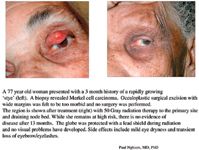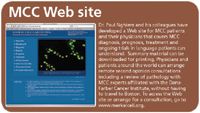- Acne
- Actinic Keratosis
- Aesthetics
- Alopecia
- Atopic Dermatitis
- Buy-and-Bill
- COVID-19
- Case-Based Roundtable
- Chronic Hand Eczema
- Chronic Spontaneous Urticaria
- Drug Watch
- Eczema
- General Dermatology
- Hidradenitis Suppurativa
- Melasma
- NP and PA
- Pediatric Dermatology
- Pigmentary Disorders
- Practice Management
- Precision Medicine and Biologics
- Prurigo Nodularis
- Psoriasis
- Psoriatic Arthritis
- Rare Disease
- Rosacea
- Skin Cancer
- Vitiligo
- Wound Care
Article
Scarce data impedes MCC treatment
Boston — Radiation therapy effectively reduces recurrence and progressive disease in Merkel cell carcinoma (MCC), but conflicting opinions about optimal treatment have kept many patients from receiving this relatively benign therapy.
Boston - Radiation therapy effectively reduces recurrence and progressive disease in Merkel cell carcinoma (MCC), but conflicting opinions about optimal treatment have kept many patients from receiving this relatively benign therapy.

But its rarity has left experts with scant data on which to base clinical decisions.

Adjuvant radiation therapy Adjuvant radiation therapy (XRT) diminishes recurrence whether patients have received narrow, wide or Mohs' excision of their Merkel cell carcinoma. In an Australian study, adding radiation reduced the rate of recurrence to 30 percent of 34 patients first treated with narrow excision, compared to a recurrence rate of 100 percent for 38 patients treated only with narrow excision. Adjuvant radiation also improved the median time to relapse from six months to 17 months1.

The global published experience for MCC treated with Mohs (70 patients) suggests that adding radiation therapy cuts both local and regional recurrence rates by about 50 percent2.
Recently, Mortier et al, found that using radiotherapy alone in MCC was surprisingly effective. Nine stage I patients (no nodal or distant disease) were treated with radiation only. After three years there were no recurrences among these patients3. Unlike melanoma, most MCC recurrences happen within two years, so a three-year follow-up for MCC is reasonable.
Local persistence Rapid lymphatic spread may explain the high rates of local persistence and nodal metastasis in MCC. About 33 percent of clinically uninvolved lymph node beds contain metastases, demonstrating an early movement of the disease out of primary lesions into the lymphatic system.
Therefore, in contrast to earlier studies, Mortier administered wide-field radiotherapy to all patients - radiation to the primary tumor, lymph nodes and, in 40 percent of patients, to the in-transit regions. Mortier's group also applied higher doses of radiation - 6,000 rad (60 Gy) delivered in 30 treatments, compared to the more typical dose of 5,000 rad (50 Gy) given in 25 treatments.
"These results need to be interpreted with caution because of the small number of patients," Dr. Nghiem advises. "Nevertheless, this study is consistent with the unique sensitivity of MCC to radiation, even as monotherapy."
Where MCC is found Merkel cell carcinoma is usually found in elderly Caucasians who have had extensive sun exposure and in immune compromised people such as solid organ transplant recipients and HIV-positive patients.
Newsletter
Like what you’re reading? Subscribe to Dermatology Times for weekly updates on therapies, innovations, and real-world practice tips.















